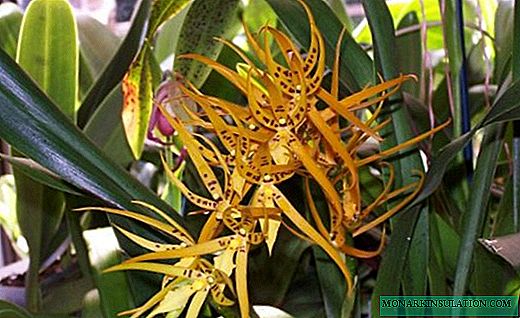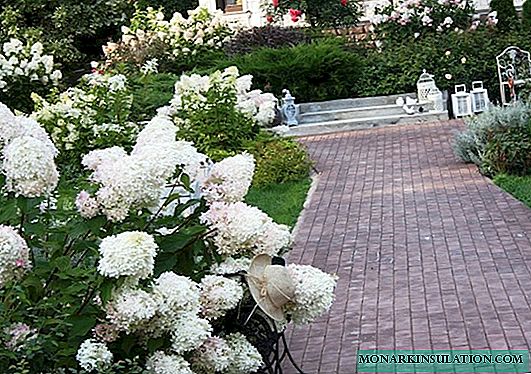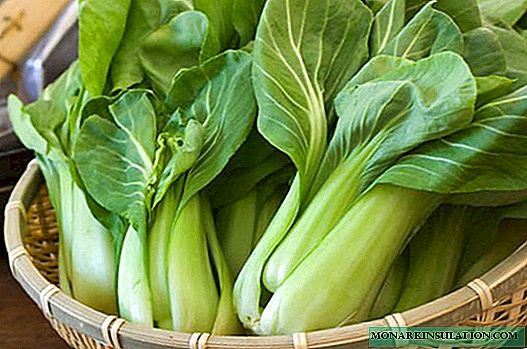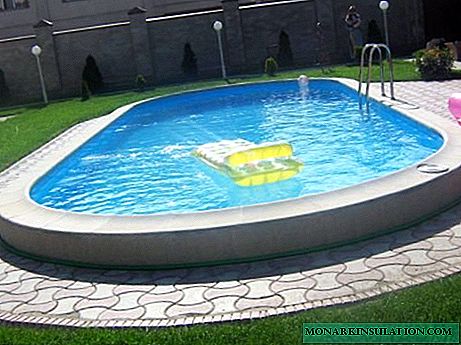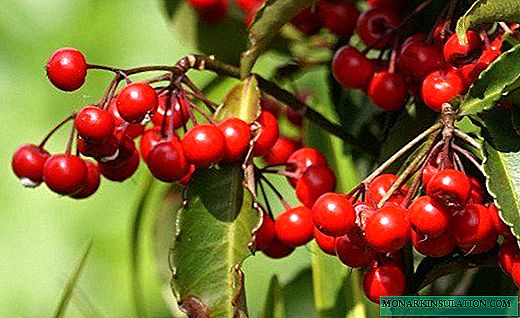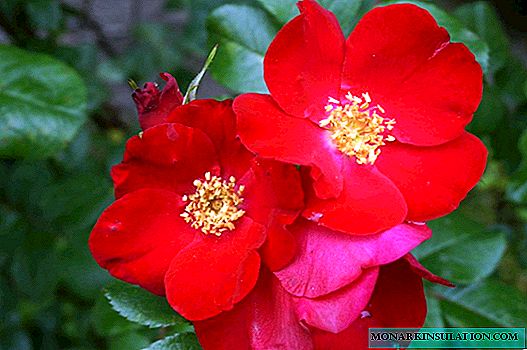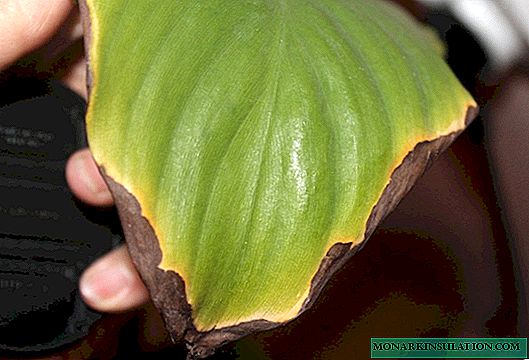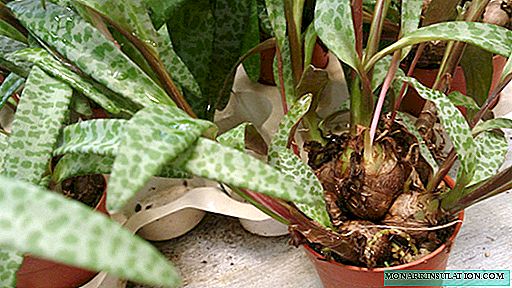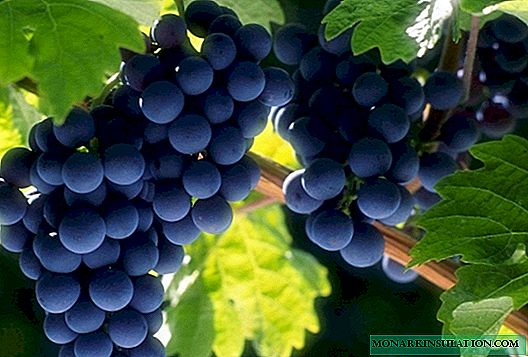Godetia is an annual flower of the Cypriot family from North America, where it is called "California Rose". It is found on the edges, meadows, banks of water bodies. Named after the Swiss botanist Godet, who first described the plant. In Europe, popular since the mid-19th century. Bright and attractive, it adorns flowerbeds, rabatka, mixborders, is in demand in landscape design and lives in room conditions. The plant is unpretentious, tolerates temperature extremes, freezing.
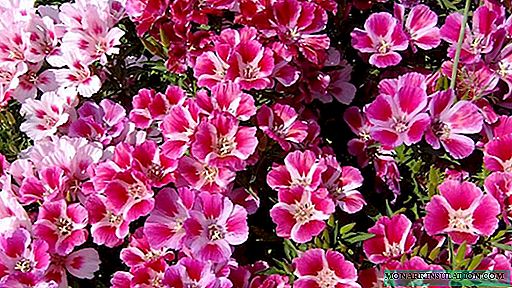
Features of Godetia
Godetia bushes grow vertically and resemble a pyramid, spreading. Shoots are smooth, branched, up to 60 cm long, erect, can be creeping. At the beginning of summer they are grassy, then they become woody. The leaf blades are bright green, oblong, narrow, pointed at the end, arranged alternately on the stem, 4-10 cm in diameter. The root of the plant is shallow, with small branches. Peduncles are very short.
Flowers in the shape of a bell or bowl with a pleasant, rich aroma of vanilla. They have 4 petals, which are simple, satin, silk, terry, wavy, one tone or multi-colored. It blooms from July to the end of October. The color is very different: pink, purple, coral, white, red, lilac. They remain open in any weather, do not lose their decorativeness until late fall. The fruit is a cylinder-shaped box with small seeds.  Azalea flower
Azalea flower
Types and varieties of godetia
More than 20 species of godetia are classified, of which different varieties are selected.
View | Description | Flowers |
| Large flowered | Fragile, pubescent shoots grow to 20-40 cm, lignified at the end of the growing season. Leaves narrowed at the base. Root inflorescences are located at the ends of shoots. It blooms from mid-July to the first frost. | Diameters up to 10 cm, silky, funnel-shaped, lush, terry, simple. The color scheme is cherry, lilac, pink, white. |
| Pleasant (lovely) | Up to 60 cm high, medium-branched, erect. Leaves on petioles arranged alternately. Flowering time from July to September. | Cup-shaped, funnel, there are terry, satin. Color - all shades of red-pink, white. |
| Terry | Hybrid does not exist in the natural environment. | Terry of varying degrees and colors. |
| Azalea flower | It tolerates low temperatures, reaches 25 cm. | In the form of a bell, pink scale, large. |
Varieties of Godecia
Title | Height (cm) | Flowers |
| Weiser Schwann | 35 | Satin, white, cupped, solid. |
| White Swan | 30 | Simple, white. |
| Orange glory | 40 | Non-double, orange. |
| York | 35-40 | Wine color and white at the base. |
| Blitzstrahl | 45-60 | Bright red. |
| Sybil Sherwood | 40-50 | Bright coral with a white border. |
| Rembrandt | 30-35 | Terry, tomato shade in the center and bordered with white. |
| Meteor | 25-30 | Dark red, burgundy with purple, white at the base, large. |
| Summer paradise | 40-50 | Pink, white. |
| Memorial | 45-60 | Snow-white, terry. |
| Girl Blush | 45 | Large, pale pink at the edges, red in the middle. |
| Red wine | 40 | Raspberry maroon. |
| Rosea | 60 | Purple-pink, dark in the middle. |
| Crystal snowflake | 75 | Snow-white. |
| Kirshkenigin | 60 | Rose red. |
| Butterfly | 50 | Terry, wavy, pink-carmine. |
| Orange glory | 45 | Silky, bright, salmon. |
| Maiden blush | Red, light pink, with scarlet dots in the middle. | |
| Summer kiss | Pink, with red in the middle, wavy, shiny. | |
| Diamond | 30-40 | Red with white spots. |
| Beauty | 30-45 | Delicate, silky, scarlet. |
| Stained glass window | 40 | Wavy, salmon, yellow in the center. |
| Monarch | 20 | Bell-shaped, pink, purple with blue, white with red. |
| King of fire | 25-30 | White in the middle, scarlet around the edges. |
| Feuerkenig | 25 | Scarlet, in the center is a white spot. |
| Honey moon | 35 | Pink, white, cherry. |
| Lava | 40 | Large, wavy, carmine red. |
Growing proudia from seeds
The flower propagates by seeds; two methods of growing goodetium are used.  Large flowered
Large flowered
Into the ground
In warm areas where there is a lot of snow and a temperature of -15 ... -20 ° C, sowing of seeds is allowed in late autumn. First, soak in manganese for half an hour (weak solution). The soil of godetsia prefers fertile, neutral, loamy, slightly acidic. Grooves are done in advance with an interval of 10-12 cm, a depth of 5-6 cm. The seeds planted before winter are not watered, sown densely, covered with peat and protective material. Shoots appear in May. When reaching a height of 7 cm, the plants are thinned out, keeping an interval of 20 cm from each other or transplanted to a constant place.
Flowers are sown in open ground in April, covered with a film to accelerate seedlings. After sprouts are thinned or seated. Take care the same as seedlings. Blooms are waiting for a long time, up to 3 months.
Seedlings
Growing from seeds in the northern regions is best done using the seedling method, so godetia will bloom earlier. Sown in late March, in boxes. Prepare the soil from peat, sand, garden soil, taken equally or take purchased.
For convenience, small seeds are mixed with sand. Dishes and dishes in order to avoid illnesses are disinfected, spilled with boiling water, and disinfected with Fundazole. The soil is watered when the water is absorbed, seeds are scattered, covered with a thin layer of soil by 0.5 cm. Cover with a film, periodically ventilate. Humidify from a spray bottle. They emerge after 10 days, then the film is removed.
Light for them requires 12 hours a day, watering moderate. The temperature is set + 20 ... +22 ° C. At the beginning of May they harden, take out on the street for 2 hours, increasing the time every day. When the threat of frost passes, leave overnight.
Water, not allowing the soil to dry out. After the appearance of sprouts, they are fed for the first time and a week before planting in the ground. Dive seedlings after the appearance of two true leaves. Peat pots, cassettes, tablets are best suited for this. At the same time, the roots are cut by 2-3 cm. Fertilized with complex mixtures for flowers in a week.
If the sprouts are pulled out, the reason is the lack of lighting, you need to rearrange the plants in a more lighted place or artificial lighting.
Planting seedlings in open ground
In the garden, a flower is planted 6 cm tall, after a wave of frosts. The site is selected open, well-lit, in the shade of the flowers will not be large. On the eve of planting, the earth is dug up twice, mineral complexes with humus and wood ash are introduced. Planted by the pass method, together with a lump of land, since godetia negatively reacts to a transplant. The time for planting is chosen in the early morning or evening. Water the first week abundantly, mulch around the soil. The distance is maintained 20 cm for low grades, for high - 40 cm.  Terry
Terry
Outdoor godetia care
To enjoy the blooming look of godetia, it is important to follow all the rules of care - watering, top dressing, weeding.
Watering
Bushes are watered sparingly and often, while avoiding overmoistening of the soil and drought, not with cold water.
Top dressing
Depending on the composition of the soil, plants are fertilized once or twice a month. First, a week after planting in the ground. With the formation of buds, mineral complexes are introduced. An excess of nitrogen cannot be allowed, this will lead to an abundant growth of foliage, but the flowers will be small. They feed with Nitrophos (12 liters of water and a tablespoon of the product), Agricola, Ideal.
Weeding
Bushes constantly weed from weeds, loosen the earth after watering.
Formation
Wilted flowers are removed and thus prolong flowering. Dry leaves are also removed, plants that are too tall are tied to supports, otherwise they will bend from gravity and will look unsightly.
After flowering
Seed ripening occurs four weeks after the expiration of the bloom. When the seed boxes darken, they are cut, then dried, seeds are extracted that retain viability for 4 years. With the onset of frost, the bushes are cleaned together with the root and burned so that the diseases do not spread, they dig the earth.  Pleasant
Pleasant
Diseases and pests
If you violate the rules of care, godetia can become ill or be exposed to pests.
Disease / Pest | Manifestations | Remedial measures |
| Root rot | The root system blackens, the leaves dry out. | The infected parts are removed, burned, the soil is treated with copper sulfate. |
| Powdery mildew | White coating. | They are treated with Topaz, Fundazol. |
| Peronosporosis | Small spots on the leaves. | Apply drugs: Abiga-Peak, Oksikhom, Previkur. |
| Rust | Brown spots. | Spray Bordeaux liquid 1%. |
| Aphid | Green insects. | Apply folk remedies, solutions: soap, wood ash, tobacco. In advanced cases, insecticides are effective (Tanrek, Aktara). |
Mr. Dachnik recommends: tips for growing godetia in the open ground
For active flower growth, it is necessary to remember the distinctive features of care:
- The place is chosen without drafts, it is possible with light partial shade.
- Seedlings are planted on the street only until buds are formed, not blooming.
- Peat and urea are added to alkaline soil before planting.
- Together with digging, charcoal, humus, compost are added.
- Watering is chosen by drip, plentiful is needed in drought, the rest of the time an excess of moisture can lead to disease.
- Bushes are sprayed in the heat only after sunset.
- Pinch the extra ovary.
- For better flowering, white clay is mixed into the soil.
Bushes shade in severe drought. Tanks for growing a flower on the street pick up light colors so that they are slightly heated and install drainage, avoiding stagnation of excess fluid.
Features of care for expiration at home
For indoor window sill, undersized species of godetia are suitable, you can put it from the southern, eastern side, with the scorching sun shade. The temperature of the flower is suitable +23 ° C, humidity 55-60%. The pot is selected with a drainage layer. The substrate is bought or prepared independently. Water the flower with soft, settled water at room temperature. If the plant is tall, make a support. They are fed 2 times a month, with fertilizers with a low nitrogen content, the soil in the pot is periodically loosened.

